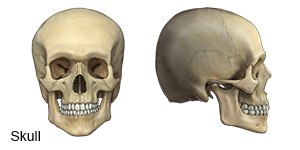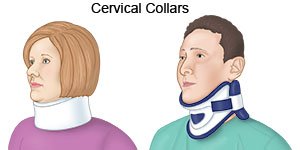Skull Fracture
Medically reviewed by Drugs.com. Last updated on Aug 4, 2025.
What is a skull fracture?
A skull fracture is a break in a bone in your head.
 |
What are the signs and symptoms of a skull fracture?
Signs and symptoms depend on the cause of your skull fracture:
- Headaches, dizziness, or jaw pain
- Nausea or vomiting
- Blood or clear fluid coming out of your nose or one or both of your ears
- Bruising behind your ears or around your eyes
- Misshapen head
- Drooping on one side of your face, or trouble moving one side of your face or closing your eye
- Hearing problems, such as ringing in your ears and hearing loss
- Trouble moving your arms and legs or raising your shoulders
- Neck pain and trouble moving your neck
- Trouble swallowing, dry mouth, or drooling on one side of your mouth
- Uncontrollable eye movements, not being able to move one of your eyes, or blurred or double vision
How is a skull fracture diagnosed?
- An x-ray, a CT scan, or MRI may be used to check for broken bones and tissue swelling. You may be given contrast liquid to help damage show up in the pictures. Tell the healthcare provider if you have ever had an allergic reaction to contrast liquid. Do not enter the MRI room with any metal. Metal can cause serious injury. Tell the healthcare provider if you have any metal in or on your body.
- A nasal CSF test is done to check for a cerebral spinal fluid (CSF) leak caused by a skull fracture. A test strip is used to collect fluid from your nose. The strip will show if the fluid is CSF or normal nasal drainage.
- Tests may be used to check for bleeding or discharge from your ears. You may also need tests to check your hearing. Healthcare providers may also check your facial nerves and muscles, your eyes, your memory, and how alert you are.
- A cerebral arteriography, or cerebral angiogram, is done to take pictures of the blood vessels in your head.
Related medications
How is a skull fracture treated?
- Medicines may be given to prevent or treat a bacterial infection, or to reduce swelling.
- Excess CSF may drained to relieve pressure around your brain. CSF may be sent to a lab for tests.
- A brace may be used to keep you from moving your head and neck. A neck brace may be soft or hard and helps prevent more injury while your fracture heals.

- Surgery may be needed to fix your damaged skull bones or to remove pieces of bone. Pins, plates, or screws may be used to hold the bones together or to keep your spine stable. Injuries to your brain, nerves, or blood vessels may also be treated.
Treatment options
The following list of medications are related to or used in the treatment of this condition.
Call your local emergency number (911 in the US), or have someone else call if:
- You had a seizure.
- You suddenly feel lightheaded and short of breath.
- You have chest pain when you take a deep breath or cough.
- You cough up blood.
When should I seek immediate care?
- You have blood or fluid coming out of one or both ears.
- You have worsening neck pain.
- You have eye pain or swelling around your eyes.
- One or both of your eyes begin to bulge.
- Your arm or leg feels warm, tender, and painful. It may look swollen and red.
When should I call my doctor?
- People close to you notice changes in how you act.
- You have a fever.
- You have a headache that does not improve after you take medicine.
- You have ear pain.
- You are vomiting.
- You have questions or concerns about your condition or care.
Care Agreement
You have the right to help plan your care. Learn about your health condition and how it may be treated. Discuss treatment options with your healthcare providers to decide what care you want to receive. You always have the right to refuse treatment. The above information is an educational aid only. It is not intended as medical advice for individual conditions or treatments. Talk to your doctor, nurse or pharmacist before following any medical regimen to see if it is safe and effective for you.© Copyright Merative 2025 Information is for End User's use only and may not be sold, redistributed or otherwise used for commercial purposes.
Learn more about Skull Fracture
Treatment options
- Medications for Head Injury
- Medications for Head Injury w/ Intracranial Hemorrhage and Loss of Consciousness
- Medications for Head Injury with Intracranial Hemorrhage
- Medications for Head Injury with Loss of Consciousness
Care guides
Symptoms and treatments
Further information
Always consult your healthcare provider to ensure the information displayed on this page applies to your personal circumstances.
